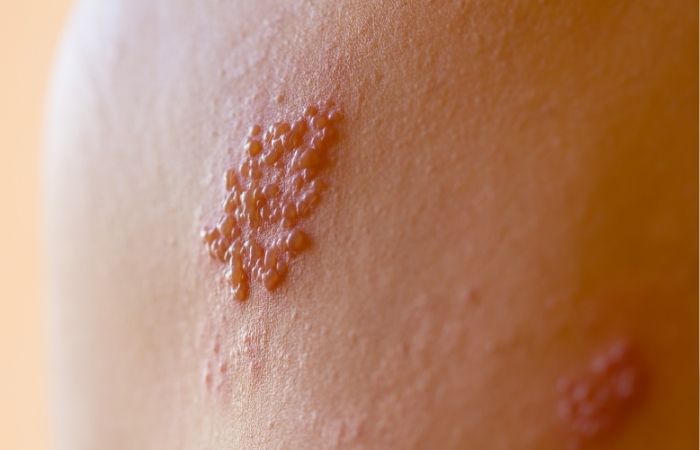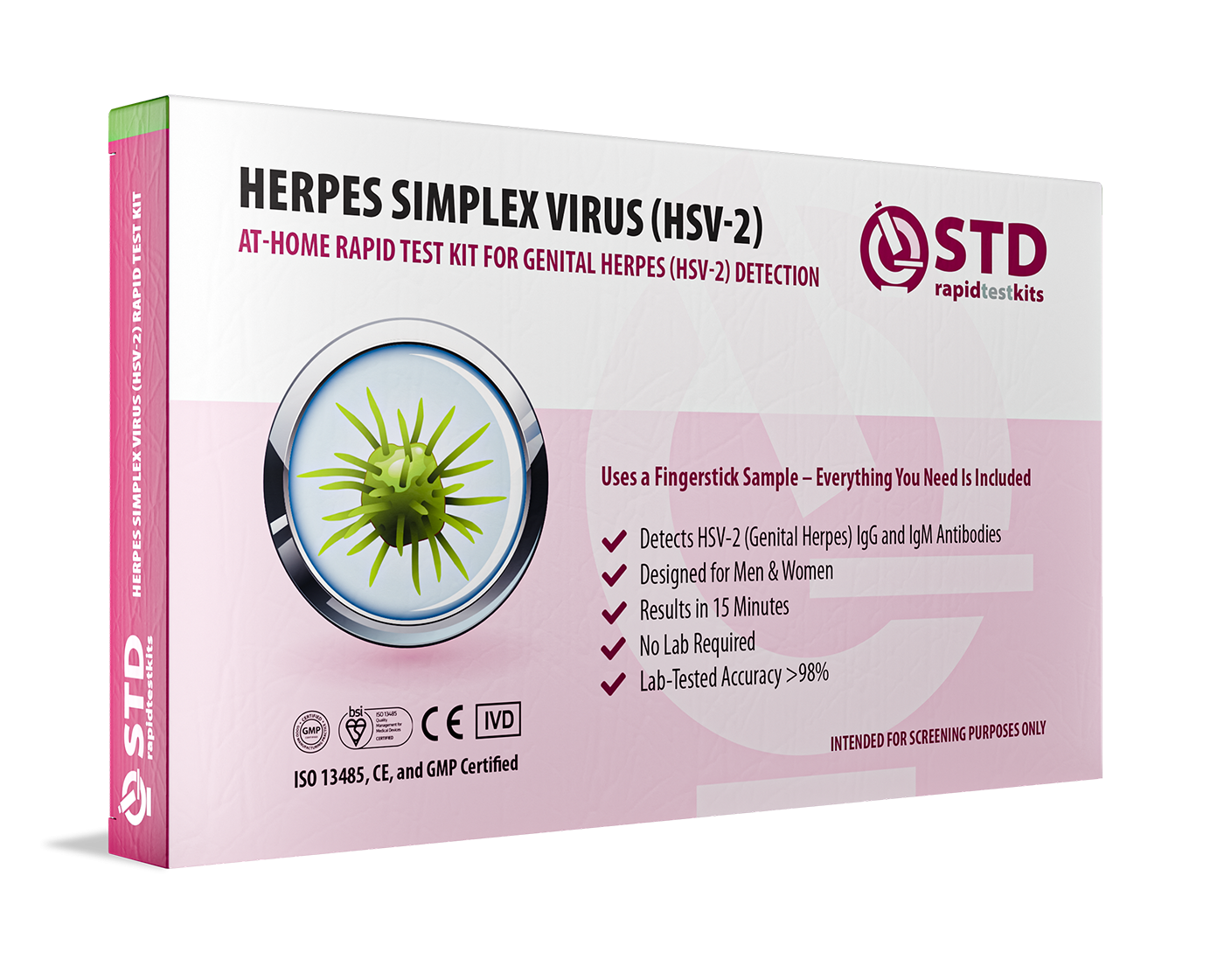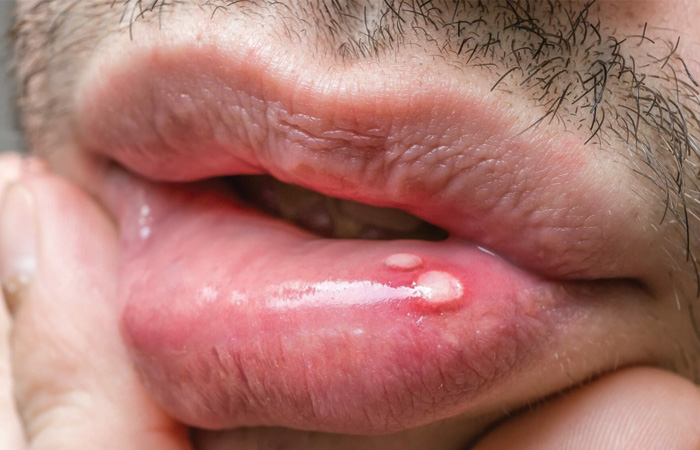Quick Answer: Herpes spreads through skin-to-skin contact, not just fluids, meaning even with condoms, you can still catch it from an exposed area. Protection reduces risk, but doesn’t erase it.
“We Used a Condom”, The Phrase That Haunts Herpes Diagnoses
Marcus, 27, was stunned when his ex called crying, saying she tested positive for herpes. “But we always used protection,” she repeated, almost like a prayer. Marcus remembered the weekend trips, the hotel hookups, the passion and the laughter, and yes, the condoms. Every time.
So why did both of them now have HSV-2? The answer lies in where herpes lives, and how it spreads. Unlike STDs like chlamydia or gonorrhea, which primarily transmit through fluids, herpes can be passed through skin contact. Even a tiny patch of uncovered skin around the genitals, groin, or thighs is enough.
And here’s the gut-punch for people like Marcus and his ex: transmission can happen even when no symptoms are present. Around 80% of people with genital herpes don’t know they have it, often because they’ve never had noticeable sores or thought a mild flare-up was just irritation from shaving or friction.
How Herpes Actually Spreads (It’s Not What You Think)
Most people assume herpes requires some visible outbreak, a cold sore, a blister, something angry-looking. But herpes is a master of stealth. It hides in nerve endings, periodically reactivating even when there’s no visible sign. During these times, called “asymptomatic shedding,” it can still be contagious.
So let’s say someone has no symptoms. They’re using condoms. They’re even freshly tested, but their test doesn’t include herpes (many standard STD panels don’t). Everything seems “safe.” Then: oral sex, protected intercourse, maybe some grinding or skin contact near the base of the penis or the outer labia. That’s all it takes.
Still wondering how that could work? Here's how condom coverage compares to herpes risk zones:
| Body Area | Covered by Condom? | Herpes Transmission Risk |
|---|---|---|
| Penile Shaft (middle) | Yes | Low (if no skin issues) |
| Penis Base / Scrotum | No | Moderate to High |
| Vulva / Labia Majora | No | High |
| Anus / Perineum | No | High |
| Oral Mucosa (mouth) | N/A | Very High (for HSV-1) |
Figure 1. Condom coverage vs herpes exposure zones, why "protected" sex doesn't always mean "safe" from skin-to-skin infections.
In other words, condoms are essential, but they’re not a magic shield. They're like an umbrella in a sideways rainstorm. Helpful, yes. Total protection? Not quite.
Why Your STD Test Probably Didn’t Include Herpes
Many people, especially those who test regularly, are shocked to learn that herpes is not part of most standard STD panels. You have to specifically request it, and even then, doctors may hesitate.
Why? Herpes blood tests (like IgG type-specific serologies) can show past exposure but not necessarily tell when you got it or from whom. False positives are also a concern, especially in low-risk populations. Some providers prefer to diagnose only during symptoms using a swab from a visible sore.
This leaves many patients in the dark. You may have tested “negative” for everything, assumed you were in the clear, and unknowingly passed or received HSV during “protected” sex. That’s why so many herpes diagnoses feel like a betrayal, not just by a partner, but by the system that promised condoms and testing would keep you safe.
Let’s break down what typical STD panels include:
| STD | Included in Standard Panel? | Why It Matters |
|---|---|---|
| Chlamydia | Yes | Common, treatable with antibiotics |
| Gonorrhea | Yes | Rapid testing available; high transmission rate |
| Syphilis | Yes (blood test) | Early stages often missed without testing |
| HIV | Yes | Included in most panels, but window period matters |
| Herpes (HSV-1/2) | No (unless requested) | Often omitted; many carriers are asymptomatic |
Figure 2. What's really in your STD test panel? Herpes is often left out, even when you're told it's “comprehensive.”
If you’re reading this after a surprise diagnosis, you’re not alone. Millions of people live with HSV-1 and HSV-2. The stigma is outsized compared to the actual medical impact, and misinformation only fuels the shame.
Oral, Protected, Still Infected: The Myth of “Low-Risk” Sex
Jules, 21, had never had penetrative sex. They’d hooked up with a few people at college, mostly kissing, some oral sex. Everyone used protection. Or so they thought. So when a tiny blister appeared on their lip, they assumed it was a cold sore from stress. But when the blister reappeared on the genitals two months later, they panicked. The diagnosis? Genital HSV-1.
Jules is one of millions of people who got herpes from oral sex. That’s right, HSV-1, the same virus that causes cold sores, is now one of the leading causes of genital herpes. And condoms? They don’t cover the mouth. Dental dams? Almost no one uses them, and even if they did, they often miss the perineal or groin area where herpes can also spread.
What we call “safe” sex is often more about fluid transmission than friction contact. Herpes doesn’t need ejaculation, penetration, or even an open sore to pass, it just needs skin. Skin that looks normal. Skin that might never show a symptom. And that’s why the myth of low-risk sex continues to blindside smart, cautious people.
So many readers ask the same thing: “I didn’t even feel sick. How can I have herpes?” The answer lies in viral shedding, immune response, and how our bodies respond to infection differently.

People are also reading: I Didn’t Have Sex, But I Do Have Blisters. When Herpes Shows Up Unexpectedly
When Herpes Stays Silent, and Still Spreads
The cruel twist with herpes is that it often doesn’t announce itself. In fact, many people carry the virus for months or years before the first outbreak, if they ever have one at all. During this time, they may unknowingly transmit it to partners, especially if they assume their condom use covers all risk.
Let’s say your partner has oral HSV-1. They haven’t had a cold sore in years. You both agree to use condoms during sex, but go unprotected during oral. A few days later, you feel an itch. A week later, a tiny sore. You might not even connect the two, until a test confirms what your gut suspected. The truth? Most people who pass herpes don’t know they have it. That’s not an excuse; it’s an epidemiological reality.
To make matters more complicated, the average time from exposure to a first noticeable outbreak can vary. Some people react within days. Others may not see anything for months. That variability creates confusion, and guilt. But herpes isn’t about being reckless. It’s about being human, with skin and nerves and invisible vulnerabilities.
So how do you know if you should get tested? And what kind of test should you even ask for?
Testing for Herpes: What Works, What Doesn’t, and When
If you’ve had symptoms, like sores, blisters, or even unexplained tingling in the genital or oral region, you can get a swab test during the outbreak. This is called a PCR or viral culture, and it’s the gold standard for confirming a current infection. But it only works if the sore is still active, and timing matters. Too early or too late, and the virus may not be detected.
For people without symptoms or between outbreaks, a blood test (IgG) may help. It looks for antibodies to HSV-1 and HSV-2. But it comes with caveats: it can’t tell you where the infection is (oral vs genital), and early results may be negative if your body hasn’t developed detectable antibodies yet. That’s called the “seroconversion window,” and it can last 4–12 weeks or longer after exposure.
Here’s a general guide to herpes testing timelines:
| Testing Type | When It Works | What It Detects |
|---|---|---|
| Swab Test (PCR) | During active outbreak | Current HSV-1 or HSV-2 infection |
| Blood Test (IgG) | 4–12 weeks after exposure | Antibodies to HSV-1 and HSV-2 |
| Blood Test (IgM) | Less reliable; not recommended | Possible recent exposure (high false positives) |
Figure 3. Herpes testing methods and what each can (and can’t) tell you.
If you suspect herpes but aren’t sure when or how you were exposed, an at-home test kit may help you take that first step without judgment. Some kits offer discreet shipping and lab-grade antibody testing for HSV-2, letting you test without clinic stress.
Whether it’s a blister, a mystery itch, or just a nagging doubt, you deserve clarity.
This combo test kit checks for the most common STDs, and you can add HSV-specific screening for extra peace of mind.
Don’t wait and wonder. Knowledge really is the first step toward control, and relief.
“I Blamed Myself for Weeks”: Shame, Silence, and What Comes Next
Samantha, 34, got her herpes diagnosis a week after a fling with someone she met through a friend. They’d used protection, he even showed her his recent test results. When she told him about her symptoms, he was horrified. “I didn’t know I had anything,” he said. And maybe he really didn’t.
What followed for Samantha wasn’t just tingling or occasional blisters, it was a tsunami of self-blame. She scoured Reddit, cried into a pillow, avoided dating apps for months. “I felt dirty, like I failed the sex-ed quiz I thought I aced,” she told us.
This is where the medical and emotional realities split. Clinically, herpes is manageable. Many people never have outbreaks again. Some suppress with antivirals, others just monitor. But emotionally? It can feel like a bomb dropped on your sense of safety. That’s why it’s crucial to reframe what a herpes diagnosis means, and what it doesn’t.
It doesn’t mean you were careless. It doesn’t mean you’re unlovable. And it sure as hell doesn’t mean you’re broken. What it does mean is that you’ve joined the millions navigating a very common virus, most of whom are living full, joyful sex lives.
Living With Herpes: Dating, Disclosure, and Defining Your Boundaries
Omar, 29, waited until the third date to say anything. They’d kissed, talked about music, swapped memes. But now it was time. “I want you to know,” he said, voice shaking slightly, “I have herpes.”
She blinked. “Thanks for telling me,” she said. No drama. No disgust. Just curiosity. “Is it something we can work around?” The relief Omar felt was seismic.
Living with herpes doesn’t mean living in fear. It means learning how to navigate intimacy with honesty. Yes, some conversations will be hard. Yes, you may face rejection. But many people, especially those already educated about sexual health, respond with compassion, not judgment.
The best way to disclose is when you feel safe, grounded, and clear. You don’t need to apologize. You don’t need to overshare. You can simply say: “I want to let you know something about my health. I have genital herpes. It’s managed, and I know how to prevent transmission, but I think it’s important you’re informed.”
This isn’t just about preventing spread, it’s about building trust. Most people respect courage. And for many couples, a herpes diagnosis becomes just one more thing they navigate together, like allergies or anxiety or birth control side effects.
Check Your STD Status in Minutes
Test at Home with RemediumGenital Herpes Test Kit

 For Men & Women
For Men & Women Results in Minutes
Results in Minutes No Lab Needed
No Lab Needed Private & Discreet
Private & DiscreetOrder Now $45.99 $49.00
What Really Reduces Transmission (Besides Condoms)
Condoms help. They really do. They reduce herpes transmission risk by about 30–50%, depending on the study and the specific virus type. But they’re only part of the equation.
Daily antiviral medication like valacyclovir (Valtrex) can reduce the risk of passing herpes to a partner by an additional 50%. That means combining meds with condoms significantly lowers the odds, even more so if you also avoid sex during outbreaks or when you feel prodrome (the tingling, burning feeling that sometimes comes before sores).
Some couples decide not to use condoms at all once they understand the real risks and feel ready. Others use dental dams, suppressive meds, or simply get tested and make peace with possibilities. There’s no single formula. But there is agency.
And that’s what today’s article is really about: agency. Not panic. Not purity. Just facts, tools, and truth.
If you’re navigating this for the first time, you’re not alone. Testing, tracking symptoms, understanding your body, it can all feel like a second job. But it also connects you more deeply to your health. You learn to notice patterns. To speak up sooner. To normalize conversations that no one should have to carry in silence.
When to Retest (And Why It Still Matters)
So let’s say you’ve had a scare. Maybe you had “protected” sex with someone whose history was unclear. Maybe you’ve got a mystery rash, or maybe nothing at all, just anxiety in your gut. Should you retest?
The answer depends on timing. Herpes blood tests don’t show up right away. If your last potential exposure was under 4 weeks ago, you may get a false negative. That doesn’t mean you don’t have herpes, it means your immune system hasn’t made detectable antibodies yet.
Most clinicians recommend waiting 12–16 weeks after a potential exposure for the most accurate IgG test. If you had symptoms and a swab confirmed HSV-1 or HSV-2, you likely don’t need a blood test unless you want to understand your exposure history more clearly.
Retesting isn’t just about clarity, it’s about power. You deserve to make informed decisions, whether it’s starting meds, choosing barrier methods, or just breathing easier in your next relationship. For many, retesting becomes part of a broader sexual wellness routine: like updating your birth control, getting your pap, or checking in with your mental health.
If it’s been over 3 months since your last risk, or your last round of questioning, consider testing again. The most accurate results often take time, and herpes isn’t going anywhere fast. But neither is your right to answers.
STD Rapid Test Kits offers discreet herpes testing options with quick turnaround and no awkward waiting rooms.
You don’t have to be uncertain forever. Testing is care. Retesting is confidence.
More Than a Virus: Rebuilding Trust After Diagnosis
For some people, the hardest part of herpes isn’t the sores, it’s the stories they tell themselves after. “I’m dirty.” “I’m damaged.” “No one will love me now.” These beliefs are heavy. They’re also lies.
Herpes is not a moral failure. It’s not a punishment. It’s not even that rare. What it is… is human. And like most things human, it can be complicated, inconvenient, and a little unfair, but it can also be faced, treated, and talked about.
If you’re newly diagnosed and spiraling, take a breath. Take a day. Then take a step. Talk to someone who’s been through it. Read real stories. Explore support forums or get linked with a sex-positive therapist. What you’re feeling is valid, but it’s also temporary.
Eventually, the diagnosis will fade into your background health history. Not because it didn’t matter, but because you learned how to matter more than your virus. Because you figured out how to keep having sex, pleasure, intimacy, and connection without fear.
That’s what this article was always trying to tell you. Not just the science, not just the stats, but the survival. And the strength you didn’t know you had until now.

People are also reading: Think It’s Just a UTI? It Could Be Chlamydia Instead
FAQs
1. I used a condom. How did I still get herpes?
Because condoms don’t cover everything. Herpes spreads through skin, not just fluids, so if the virus was present on a spot the condom didn’t cover (like the base of the penis, inner thighs, labia), transmission can still happen. It doesn’t mean you were reckless. It means you were human.
2. So if someone doesn’t have symptoms, they can still pass herpes?
Yep. It’s called “asymptomatic shedding,” and it’s herpes’ sneakiest trick. You can feel fine, look fine, and still shed the virus from skin that appears totally normal. That’s why so many people unknowingly pass it, and why it’s not about blame.
3. Can oral sex really give you genital herpes?
100% yes. HSV-1 (the cold sore virus) is now one of the most common causes of genital herpes. If someone has ever had a cold sore, even years ago, they can transmit it during oral sex. Most people have no idea they’re even contagious.
4. Is it true that most STD tests don’t include herpes?
Unfortunately, yes. Herpes testing isn’t standard unless you specifically ask for it. Even then, providers may decline if you don’t have symptoms. Most people find out during an outbreak or after a partner is diagnosed. It's a wild blind spot in sexual health care.
5. How soon after a hookup can I test for herpes?
If you’ve had symptoms (like a sore or blister), you can do a swab test right away. But if you're symptom-free and just want to be sure, blood tests for antibodies are most accurate at 12–16 weeks after exposure. Earlier than that? You might get a false negative.
6. I tested negative for everything. Could I still have herpes?
Yes, and it happens more than you’d think. Unless your provider included a type-specific IgG test for HSV-1 and HSV-2, your panel probably skipped it. A “clean bill of health” doesn’t always mean what we assume it does.
7. Will anyone date me now that I have herpes?
Short answer? Yes. Longer answer? The right people will. Disclosure can be scary, but it also filters for maturity and empathy. Millions of people date, fall in love, have families, and have great sex lives with herpes. You’re not broken, you’re just informed now.
8. What’s the actual risk of passing it to someone I’m sleeping with?
With no meds or protection? About 10% per year in a mixed-status couple. With condoms and daily antivirals? That drops below 2% per year. And if you avoid sex during outbreaks or prodrome, it’s even lower. Translation: you’ve got options, and risk is manageable.
9. Can I ever have sex without a condom again?
That’s a personal choice, and one you can make with good information. Many couples decide together what risk they’re okay with. Some use meds and skip condoms. Others don’t. Herpes doesn’t mean the end of condom-free sex. It means being thoughtful, not fearful.
10. What’s the best way to test for herpes without the drama?
At-home test kits. You skip the awkward waiting room, get clear results, and take action at your own pace. The combo test kit even lets you check for HSV alongside other STDs, quick, discreet, and judgment-free.
You Deserve Answers, Not Assumptions
Herpes doesn’t just spread through reckless sex, nor does it care about how “safe” you thought you were. It spreads in quiet, invisible ways, through skin, through silence, through gaps in what we’ve been told. But it doesn’t have to steal your power. You’re still you. Still worthy. Still in control.
If you’ve ever left a hookup feeling confused, scared, or betrayed by the idea of “protected sex,” you’re not alone. Many of us were sold the condom illusion, a belief that latex was enough. It’s not. But now you know more. And with knowledge comes the chance to protect yourself, ask better questions, and move forward on your terms.
Don’t sit in the dark. This at-home combo test kit checks for the most common STDs discreetly and quickly, so you can stop guessing and start healing.
How We Sourced This Article: We combined current guidance from leading medical organizations with peer-reviewed research and lived-experience reporting to make this guide practical, compassionate, and accurate.
Sources
1. CDC – Genital Herpes - STD Facts
2. Planned Parenthood – What Is Herpes?
4. STD Treatment Guidelines: Herpes — CDC
5. Herpes Simplex Virus — World Health Organization
6. Herpes Simplex Virus‑2 Transmission Probability Estimates — NCBI PMC
7. Current Concepts for Genital Herpes Simplex Virus Infection — NCBI PMC
8. Shedding Patterns of Genital Herpes Infections — JAMA
9. Persistent Genital Herpes Simplex Virus‑2 Shedding Years Later — NCBI PMC
10. Asymptomatic Shedding of Herpes Simplex Virus 1 and 2 — Journal of Infectious Diseases
About the Author
Dr. F. David, MD is a board-certified infectious disease specialist focused on STI prevention, diagnosis, and treatment. He blends clinical precision with a no-nonsense, sex-positive approach and is committed to expanding access for readers in both urban and off-grid settings.
Reviewed by: Clara Yen, NP-C, Sexual Health Nurse Practitioner | Last medically reviewed: October 2025
This article is for informational purposes and does not replace medical advice.










